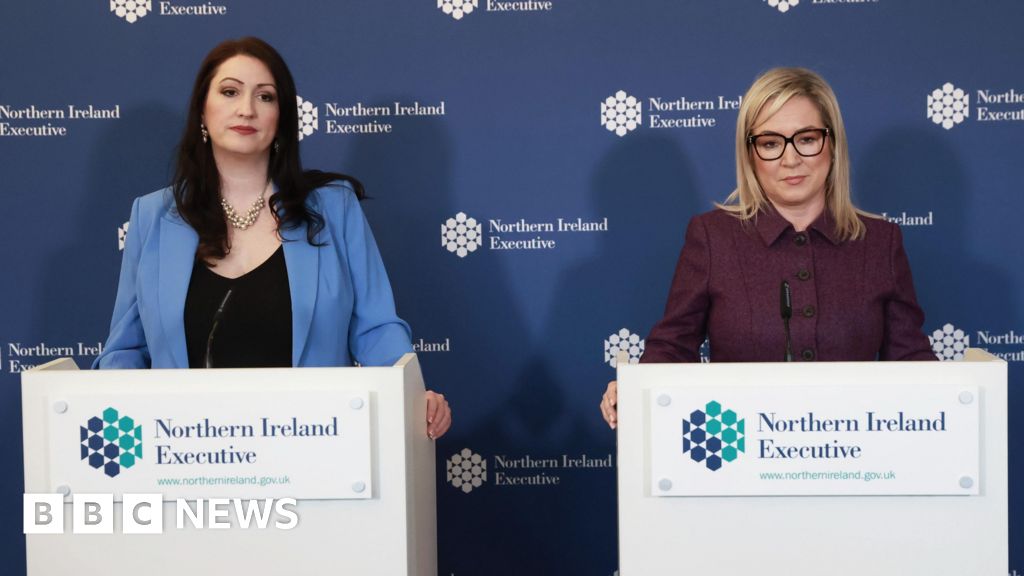Northern Ireland executive ministers agree programme for government
- BBC News
The agreement of a long-awaited programme for government by Northern Irelands ministers is an important milestone, First Minister Michelle ONeill has said.
The programme was agreed after a virtual meeting of ministers that lasted about 40 minutes on Thursday morning, a day after plans to agree the document were withdrawn at the last minute.
The document will have to be delivered to the assembly first on Monday before it can be published to the wider public.
Speaking at a press conference, ONeill said the agreed programme will "set out the foundations to help build a prosperous and sustainable future for generations to come".
"That includes focusing on priorities such as delivering improvements on childcare, cutting waiting lists, ending violence against women and girls, growing our economy and protecting the environment."
The programme for government is a document that sets out the shared priorities of all parties that make up Northern Irelands power-sharing government and targets that the Executive hopes to achieve during its mandate.
Deputy First Minister Emma Little-Pengelly said the "unanimous agreement" from ministers was "an important step in bringing about an ambitious agenda of delivery".
She said ministers were "determined to build on our reputation here as a great place to live, work and invest" and that "good progress" had already been made in many of the priority issues.
Leader of the assemblys opposition Matthew OToole called "for a clear plan".
"It is firstly an absurd situation for executive ministers to be giving press conferences asking for praise without actually publishing a PfG document," he said.
"This is supposed to be a plan for government, not an Oscar acceptance speech," he added.
"People in Northern Ireland, whether they are waiting for a consultant appointment or need support with the cost of childcare or any of the other pressing challenges, deserve real delivery."
The programme for government comes just over a year since the Northern Ireland Executive reformed in February 2024.
A draft version of the programme, an 88-page document entitled Our Plan: Doing What Matters Most, was unveiled last September before an eight-week public consultation.
More than 1,400 responses were received in the consultation process for the draft programme for government, the first and deputy first ministers said.
ONeill said there was "broad support" for the proposals put forward, but they have also "listened to the views of the public".
Little-Pengelly said that as a result they have added "commitments to address poverty and to support our ageing population".
The Secretary of State for Northern Ireland, Hilary Benn, welcomed the executives agreement on the plan.
He described it as "an important moment for the people of Northern Ireland" and said the programme "recognises the scale of the challenges facing public services, and a long-term strategic vision, together with political stability, is crucial".
He added that the UK government "is committed to being an active partner" to the executive in implementing the plans.
ONeill described as a "process issue" a last-minute postponement of the executive meeting to agree the programme for government.
A scheduled meeting was pulled on Wednesday after Alliance Party minister Andrew Muir said he wanted more time to review the final document.
He characterised it as a "storm in a teacup", but the Social Democratic and Labour Party (SDLP) described the further delay as a "farce".
Speaking to reporters about the postponement, ONeill said: "We had a process issue which we needed to work our way through, and weve got through that, and now we have unanimous agreement.
"I think the public at home would be more interested to know what our priorities are, and how realistic they are, and how were going to deliver upon them."
Little-Pengelly said there are "many different views" across a four-party coalition and they have tried to work in a way that "maximizes consensus".
Dympna McGlade, who was attending a protest in Belfast against cuts to winter fuel support, welcomed the programme for government but said "delivering it is the key".
"There are a lot of strategies outstanding. Weve been waiting on an anti-poverty strategy, fuel poverty strategy, [strategy] around children," she said.
"Theyre very slow to produce the strategies that we desperately need. They seem to do a lot of talking but we need results. There is no point introducing strategies if we dont have the resources to implement them.
"Reinstating the winter fuel payment would be a good start, look after the vulnerable."
Ciaran Molloy, a member of Unite the Unions retired members branch, said ministers need to put "something into effect" to tackle poverty and to support older people, adding that some older people are "really struggling".
"All of this is just talk unless they come up with figures and weve heard this before from local politicians," he told the BBC at the Belfast protest.
"Their priorities should be people in poor positions, especially older people who have contributed for decades towards public finances.
"Well be making sure well be putting a serious amount of pressure on them to come up with realistic proposals to deal with these issues."
The priorities set out in the draft were described by First Minister Michelle ONeill as "ambitious and focused".
There were nine key priorities:
It has been some time since a Stormont executive agreed a finalised programme for government.
The last time an executive managed to get one over the line was during the assemblys fourth term between 2011 and 2015.
Heres a timeline of events since then: